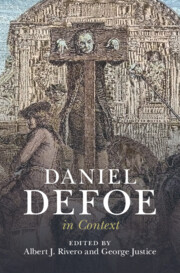Book contents
- Daniel Defoe in Context
- Daniel Defoe in Context
- Copyright page
- Contents
- Illustrations
- Notes on Contributors
- Preface
- Acknowledgements
- Chronology
- Part I Life and Works
- Part II Literary Context
- Chapter 6 Defoe and the Novel
- Chapter 7 Defoe and Popular Fiction
- Chapter 8 Verse and Verse Satire
- Chapter 9 Memories and Memorials
- Chapter 10 Periodicals, News, and Journalism
- Chapter 11 Defoe and Pornography
- Chapter 12 Defoe and Popular Religious Writing
- Chapter 13 Theatre and the Novel
- Chapter 14 The Philosophical Tradition
- Part III Authorship and Copyright
- Part IV The Monarchy and Parliament
- Part V Social Structures and Social Life
- Part VI Critical Fortunes and Literary Afterlife
- Further Reading
- Index
Chapter 10 - Periodicals, News, and Journalism
from Part II - Literary Context
Published online by Cambridge University Press: 27 April 2023
- Daniel Defoe in Context
- Daniel Defoe in Context
- Copyright page
- Contents
- Illustrations
- Notes on Contributors
- Preface
- Acknowledgements
- Chronology
- Part I Life and Works
- Part II Literary Context
- Chapter 6 Defoe and the Novel
- Chapter 7 Defoe and Popular Fiction
- Chapter 8 Verse and Verse Satire
- Chapter 9 Memories and Memorials
- Chapter 10 Periodicals, News, and Journalism
- Chapter 11 Defoe and Pornography
- Chapter 12 Defoe and Popular Religious Writing
- Chapter 13 Theatre and the Novel
- Chapter 14 The Philosophical Tradition
- Part III Authorship and Copyright
- Part IV The Monarchy and Parliament
- Part V Social Structures and Social Life
- Part VI Critical Fortunes and Literary Afterlife
- Further Reading
- Index
Summary
Although best known today as an influential early novelist and a controversial satirist, Daniel Defoe was recognized by his contemporaries, first and foremost, as a prolific journalist. Defoe seems to have principally written, edited, or contributed to perhaps two dozen periodicals during his varied career, and his journalistic output between about 1690 and 1730 amounts to many millions of words on a wide range of topics, including, reflexively, ’News-Writers’. Defoe played a formative role in the development of the periodical press in the early eighteenth century, not least because his body of work makes a sustained argument for what journalism could be and do in modern Britain. Defoe’s journalism is about journalism – about irresponsible newsmongers, credulous news readers, and the tension between ’Matters of Fact’ and what he repeatedly derides in the Review as ’false News’. This chapter surveys the broad range of Defoe’s meta-journalism in order to account for both his theory of conscientious journalism and the public perception of ’Mr. Review’ as ’Correct-General of all the News-Papers, excepting his own’.
Keywords
- Type
- Chapter
- Information
- Daniel Defoe in Context , pp. 78 - 88Publisher: Cambridge University PressPrint publication year: 2023

